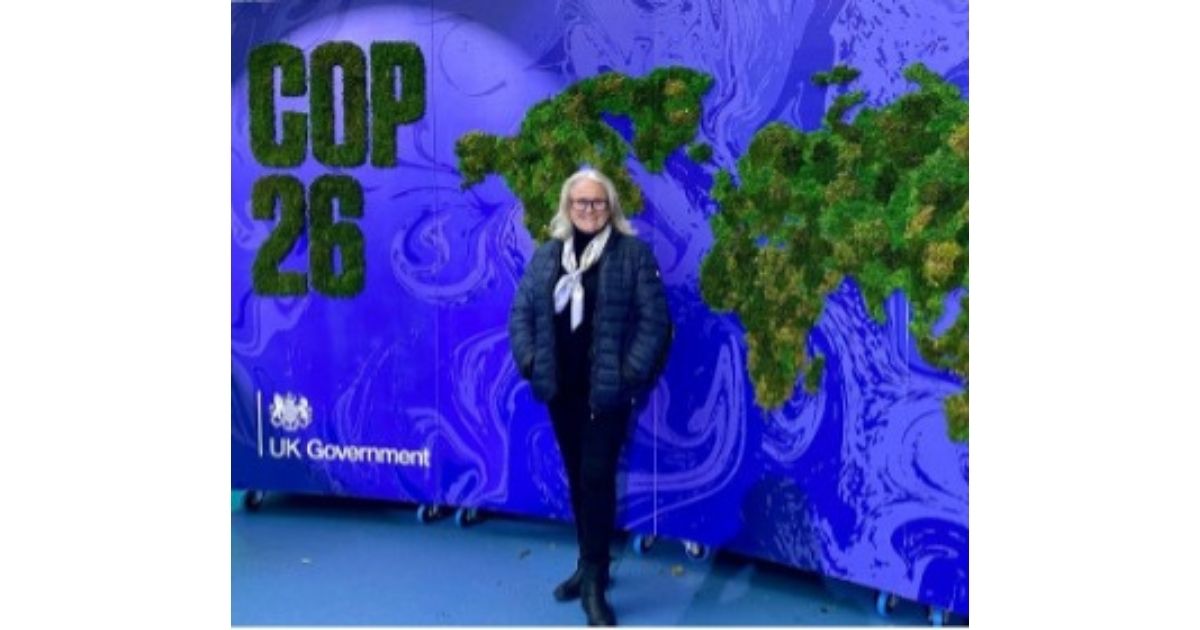By SeaKeepers Staff
The International SeaKeepers Society attended the UN Climate Change Conference (COP26) on November 1st, 2021. Our head of International Partnerships, Gill Rodrigues, attended the first public day of the 12-day summit taking place in Glasgow, Scotland. This is the biggest environmental summit the United Kingdom has ever hosted.
Gill chats with us on representing SeaKeepers overseas and what COP26 means to the future of our planet. From the collective energy at the event to accelerating climate solutions, this conference provided an historic opportunity to improve the state of our ocean.
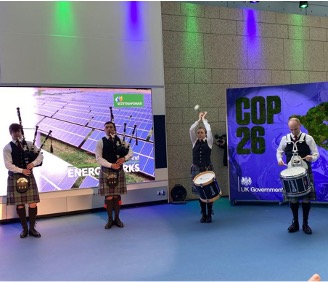 Photo credit: Gill Rodrigues
Photo credit: Gill Rodrigues
What’s the atmosphere like in Glasgow?
Glasgow was bustling on the first day of the conference. It feels as if all roads lead to the city and everyone is looking to COP26 for leadership and solutions. The main transport arteries are gridlocked as cavalcades of official cars head to the conference. Although security was tight and the queues to enter are long, once inside the atmosphere is electric and inclusive. After years of planning this crucial conference has begun, the anticipation was palpable. SeaKeepers couldn’t be more thrilled to be a part of this extraordinary summit dedicated to addressing the issues of climate change in the hopes of accelerating the transition to a zero-carbon world.
What does COP26 mean?
COP stands for Conference of the Parties. This is the 26th meeting since countries signed the United Nations Framework Convention on Climate Change (UNFCCC). It’s an opportunity for countries to come together and agree coordinated action to address catastrophic climate change.
Will COP26 make a difference?
COPs do make a difference. In Paris in 2015, countries pledged to keep the rise in Earth’s temperature below 2°C. All countries are now being urged to revise this to a 1.5C target. To stay within 1.5C, we must stop emitting carbon dioxide and other greenhouse gases, from burning fossil fuels, from agriculture and animal farming which create methane, from cutting down trees and from some industrial processes. Things that can’t be adapted or stopped altogether must be offset by increasing carbon sinks, such as forests, peatlands and wetlands, which act as vast carbon stores. We are looking to set a balance and achieve net zero. A daunting task.
Why is this conference important?
This gathering is seen as a “make-or-break” moment in the global climate emergency, with countries due to review their progress for the first time since the Paris Agreement was established in 2015. There’s also an opportunity for leading organizations and young activists to raise their voices and commit to action on climate change. As an organization that focuses on research and education for the next generation, it’s immensely important to our mission that we pave the way for a cleaner and more sustainable future.
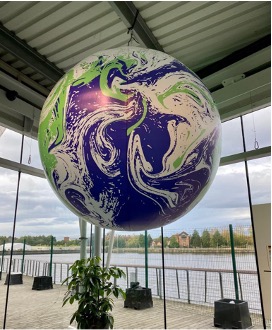 Photo credit: Gill Rodrigues
Photo credit: Gill Rodrigues
What’s the main focus of this summit?
Temperature rise must slow down if we want to avoid the worst consequences of climate change, scientists say global warming needs to be kept to 1.5C by 2100. However, unless action is taken, the planet could still warm by more than 2C by the end of this century. If nothing is done, scientists think global warming could exceed 4C, leading to devastating heatwaves, millions losing their homes to rising sea levels, and irreversible loss of plant and animal species.
Why is ocean conservation and research important? Decision-makers agree that we can’t address the climate crisis without protecting the ocean. The vastness of our oceans has always been unfathomable, and it is relatively unexplored. But we know it plays a key role in our climate. Better understanding of deep-sea biodiversity will offer insight into how these systems influence the climate & are influenced by climate change.
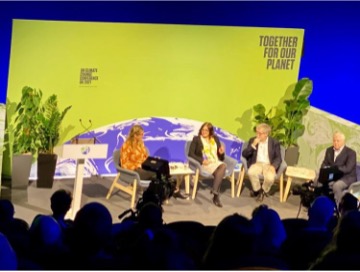 Photo credit: Gill Rodrigues
Photo credit: Gill Rodrigues
What was the highlight of the day for you?
On the first day, I attended SeaKeepers’ partner and longtime supporter, Schmidt Ocean Institute’s session: CLIMATE AND THE DEEP-SEA WORLD: SCHMIDT OCEAN INSTITUTE’S GLOBAL EFFORTS – A VISUAL JOURNEY AND PANEL. It was a vibrant, capacity event with a live question and answer session.
The panel focused on climate impacts in the deep sea and how we can better understand and mitigate this in order to improve the overall health of our planet.
The panel included ocean experts focused on high seas, biodiversity, and seabed mapping. They highlighted how little we know about ocean biodiversity, that one scientific discovery can change our whole perception of the deep sea and our knowledge is changing daily. It sometimes feels the deeper we go the less we know. But it’s all about readjustment and there is so much yet to explore.
The most important thing we can do is make changes at ground level. SeaKeepers is working to connect the public with the ocean. We hope to do this by engaging the yachting community and encouraging them to harness their power and reach to support ocean research and conservation, whilst also engaging students globally in what they can do in their coastal communities.
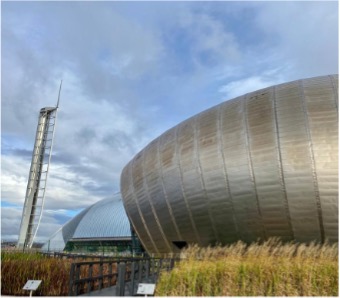 Photo credit: Gill Rodrigues
Photo credit: Gill Rodrigues
What role did SeaKeepers play in COP26?
I attended this conference to represent all SeaKeepers and to include us in this critical conversation. This summit has never been more relevant, especially with the launching of our Carbon Impact Program in 2022. Working with vessels, ocean activists, and students has put us in an extraordinary position to encourage sustainable practices at sea by measuring carbon impact. Our Green Guide to Boating will raise awareness on ocean sustainability and conservation by offering resources, advice and examples of what makes a green boater. This project will allow us to take the next step in protecting the oceans we love.
#COP26 – In the Rear View Mirror
After two long weeks, we have come to the end of the summit – a summit which promised so much yet is tinged with a feeling that we didn’t quite succeed on what we initially set out to accomplish. Upon reflection, the outcomes make us ask: Did we dilute what we really wanted to achieve? Are we still on target? Or have we disappointed the watching world and produced a watered-down version of our promise?
In short – Can we return to our home countries with the belief that we can limit temperature rise to 1.5°C (34.7°F) above pre-industrial levels?
The agreement concluded with the use of words “phase down” as opposed to “phase out” ; but in return we now have pacts on greenhouse gas emissions, cutting methane, curbing oil, and gas exploration, protecting our forests, and striving for clean power. While more could have been achieved, as this conference opened, we were far from meeting the Paris Agreement goals. If we take Glasgow as the starting point for taking these topics seriously, committing as realistically as possible to more impactful action by this time next year, then I believe this conference has been a major step forward.
We now have clear direction on moving away from coal. We have taken steps to attempt to limit the rapid temperature rise – not enough, perhaps, but we must keep this momentum going. Our governments have agreed to take more action to combat climate change but ultimately it is in all our hands to push forward, locally, and globally.
SeaKeepers has the immense power of vessel owners, ocean advocates and members from all around the world to support ground-breaking environmental projects. As an organization we are taking the first steps in making 2022 THE year for the climate of change, beginning with our Carbon Impact Program and Green Guide to Boating designed to provide guidance and resources to boat owners and individuals alike. This will be in partnership with the SeaKeepers Asia Chapter based in Singapore, tackling two sides of the hemisphere. SeaKeepers programming continues to focus on oceanographic research, education for the next generation, and awareness. ‘Together For Our Planet’ is more than a slogan.”
What is your final take away?
This conference allowed me to represent SeaKeepers in an historic opportunity. As part of one ecosystem, we have the power to change the future, and the outcome of this conference has the power to do it. The SeaKeepers motto has never been more important than it is today: “Research. Educate. Protect and Restore.”


